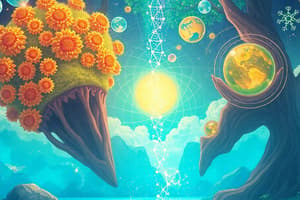Podcast
Questions and Answers
Match the branch of science with its primary focus:
Match the branch of science with its primary focus:
Natural Sciences = Study of natural phenomena Social Sciences = Study of human behavior and societies Formal Sciences = Study of abstract concepts and structures Applied Sciences = Practical application of scientific knowledge
Match the following natural sciences with their specific studies:
Match the following natural sciences with their specific studies:
Physics = Study of matter and energy Chemistry = Study of substances and their interactions Biology = Study of living organisms Geology = Study of Earth and its processes
Match the social science with its area of study:
Match the social science with its area of study:
Psychology = Study of mind and behavior Sociology = Study of social behavior and structures Economics = Study of production and consumption Anthropology = Study of cultures and human societies
Match the formal science with its specific focus:
Match the formal science with its specific focus:
Match the applied science with its primary application:
Match the applied science with its primary application:
Match the step of the scientific method with its description:
Match the step of the scientific method with its description:
Match the key concept with its definition:
Match the key concept with its definition:
Match the following scientific concepts with their examples:
Match the following scientific concepts with their examples:
Match the importance of science with its impact:
Match the importance of science with its impact:
Flashcards are hidden until you start studying
Study Notes
Definition of Science
- Systematic enterprise that builds and organizes knowledge in the form of testable explanations and predictions about the universe.
Branches of Science
-
Natural Sciences
- Study of natural phenomena.
- Includes:
- Physics: Study of matter and energy.
- Chemistry: Study of substances and their interactions.
- Biology: Study of living organisms.
-
Social Sciences
- Study of human behavior and societies.
- Includes:
- Psychology: Study of mind and behavior.
- Sociology: Study of social behavior and structures.
- Economics: Study of production, distribution, and consumption of goods and services.
-
Formal Sciences
- Study of abstract concepts and structures.
- Includes:
- Mathematics: Study of numbers, shapes, and patterns.
- Logic: Study of reasoning and argument.
-
Applied Sciences
- Practical application of scientific knowledge to solve real-world problems.
- Includes:
- Engineering: Application of scientific principles for design and construction.
- Medicine: Application of biology and chemistry for health care.
Scientific Method
- Observation: Gathering data and noticing phenomena.
- Question: Formulating questions based on observations.
- Hypothesis: Proposing a testable explanation.
- Experiment: Conducting tests to support or refute the hypothesis.
- Analysis: Interpreting data and drawing conclusions.
- Communication: Sharing results with the scientific community.
Key Concepts
- Theory: Well-substantiated explanation based on a body of evidence (e.g., theory of evolution).
- Law: Statement based on repeated experimental observations that describe an aspect of the universe (e.g., Newton's laws of motion).
- Variable: Any factor, trait, or condition that can exist in differing amounts or types (independent, dependent, and controlled variables).
Importance of Science
- Advances understanding of the universe and our place in it.
- Drives technological innovation and improvements in quality of life.
- Informs public policy and contributes to societal progress.
- Encourages critical thinking and problem-solving skills.
Definition of Science
- Science is a systematic approach for building and organizing knowledge through testable explanations and predictions about the universe.
Branches of Science
-
Natural Sciences: Focus on natural phenomena.
- Physics: Examines matter and energy.
- Chemistry: Investigates substances and their interactions.
- Biology: Studies living organisms and their life processes.
-
Social Sciences: Analyze human behavior and societal structures.
- Psychology: Explores mind and behavior.
- Sociology: Studies social behavior and community structures.
- Economics: Looks into the production, distribution, and consumption of goods and services.
-
Formal Sciences: Concerned with abstract concepts.
- Mathematics: Involves the study of numbers, shapes, and their relationships.
- Logic: Focuses on principles of reasoning and argumentation.
-
Applied Sciences: Utilize scientific knowledge for practical applications.
- Engineering: Involves design and construction based on scientific principles.
- Medicine: Applies biology and chemistry to healthcare and treatments.
Scientific Method
- Observation: Involves gathering data and noting phenomena.
- Question: Formulating inquiries based on observations made.
- Hypothesis: Proposing a testable explanation for the observations.
- Experiment: Carrying out tests to validate or dispute the hypothesis.
- Analysis: Interpreting the data and formulating conclusions.
- Communication: Sharing findings with the broader scientific community.
Key Concepts
- Theory: A thoroughly supported explanation based on extensive evidence, such as the theory of evolution.
- Law: A consistent statement derived from repeated experimental observations, like Newton's laws of motion.
- Variable: A factor that can vary in different scenarios, categorized as independent, dependent, or controlled variables.
Importance of Science
- Enhances understanding of the universe and human existence within it.
- Fuels technological advancements and contributes to improved quality of life.
- Informs public policy and fosters societal development.
- Cultivates critical thinking and effective problem-solving abilities.
Studying That Suits You
Use AI to generate personalized quizzes and flashcards to suit your learning preferences.




